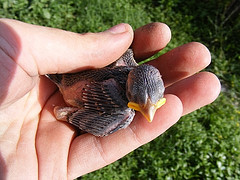It is not recommended that you ever touch a baby bird unless it is entirely necessary. If you have found an injured bird or a baby bird with no parents around, it is best to contact a wildlife rehabilitation center or a wildlife official near you for advice. It is not true that touching a baby bird will make its mother reject it due to the human smell, most birds actually have a bad sense of smell. If the bird is uninjured you should ask yourself, "Is it really an orphan?" Nine times out of ten the answer is no.
Look for nests in nearby trees and shrubs and then observe the bird from a distance, preferably with binoculars. The majority of the time the parent(s) will return. If the parents have no returned within 2-3 hours then there may be cause for concern.
It is actually illegal in the US to possess eggs, birds, nests or feathers without a permit or licence. It is also very difficult for the inexperienced to rehabilitate or raise birds. Raising baby birds should be left to the parents whenever possible. If the parents are around, return the young birds to where you found them. Do not place them back in the nest as they will most likely be left on their own. Although it is difficult and often not successful, it is sometimes necessary to try to rehabilitate injured birds or raise young birds.
One thing you should remember is that if a baby bird does not survive, it is simply nature. Not every bird that hatches will survive. Other living things consume dead baby birds to survive and although this is hard to accept, particularly for children, we must try our best not to interfere with nature too much. The life expectancy of a small songbird born in your yard is just 10 months.
Look for nests in nearby trees and shrubs and then observe the bird from a distance, preferably with binoculars. The majority of the time the parent(s) will return. If the parents have no returned within 2-3 hours then there may be cause for concern.
It is actually illegal in the US to possess eggs, birds, nests or feathers without a permit or licence. It is also very difficult for the inexperienced to rehabilitate or raise birds. Raising baby birds should be left to the parents whenever possible. If the parents are around, return the young birds to where you found them. Do not place them back in the nest as they will most likely be left on their own. Although it is difficult and often not successful, it is sometimes necessary to try to rehabilitate injured birds or raise young birds.
One thing you should remember is that if a baby bird does not survive, it is simply nature. Not every bird that hatches will survive. Other living things consume dead baby birds to survive and although this is hard to accept, particularly for children, we must try our best not to interfere with nature too much. The life expectancy of a small songbird born in your yard is just 10 months.

